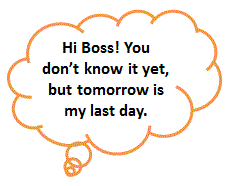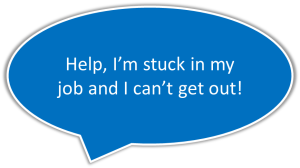Tag: how to cope until you quit
How You Quit Matters
 When leaving a job, we all know it is best to part on good terms. You know…don’t burn any bridges. HOW you quit will stay in people’s memories long after you’re gone.
When leaving a job, we all know it is best to part on good terms. You know…don’t burn any bridges. HOW you quit will stay in people’s memories long after you’re gone.
I recommend that people set an objective for how they want to quit and be clear why it benefits them.
For example:
- Leave with a solid reputation – because it provides source of positive referrals for future companies, or the possibility of returning to your former employer.
- Exit with all of the compensation you’re entitled to – because waiting until your stock or 401K vests, or for a bonus, provides money that you may need or help cushion you through a transition.
- Quit as soon as you’ve mastered a skill, or launched a successful program – because leaving while you’re confident and proud of your work is the ideal attitude to have while launching into your next phase.
Having an objective for the way that you want to leave your job gives you something to hold onto when you’re having a particularly bad day. It is a reminder of why you aren’t storming out of the office – you’re determined to quit on your terms.
I have to note, though, that I interviewed people who reached a breaking point at work and quit suddenly. After being yelled at in front of his coworkers, one customer service representative told his supervisor that, “I will no longer allow you to treat me this way. I quit.”
Another woman I spoke with was so miserable that she couldn’t take one more day of work. She went into work, got a few things from her office, and told her manager on the way out, “I’m quitting today.”
While it is prudent to leave on good terms, the people I spoke with had no problem finding other jobs. They had felt crushed by their old jobs and standing up for themselves was a way of taking their power back. It reminded them that in fact, nobody had the right to treat them abusively.
And then there’s Marina Shifrin, who became famous for her dance video resignation letter.
Perseverance Trumps Positive Attitude
 We hear so much about how important it is to have a positive attitude. I think it is helpful to remind ourselves of what we’re grateful for because it keeps us from dwelling on what’s wrong, generally makes us feel more content with our lives, and because Oprah does it every day. Seriously! I recently went to her “Live The Life You Want” event and she credits her daily gratitude practice as part of her success.
We hear so much about how important it is to have a positive attitude. I think it is helpful to remind ourselves of what we’re grateful for because it keeps us from dwelling on what’s wrong, generally makes us feel more content with our lives, and because Oprah does it every day. Seriously! I recently went to her “Live The Life You Want” event and she credits her daily gratitude practice as part of her success.
I believe that choosing to focus on thoughts that are useful versus ones that drag us down makes sense. In my own recent experience with losing my beloved cat, consciously choosing to think that I made the best decisions possible at the end of his life has helped me cope.
I also believe there is merit to the law of attraction. Sometimes I seem to manifest whatever I’m focused on, for good or bad. I try to keep it positive so that I’ll manifest great things like my beautiful Dodge Challenger!
However, I don’t think that a positive attitude ensures we will only attract beneficial things into our lives, or that we can force our minds into thinking we’re happy when really we’re not. That would be arrogant, wouldn’t it, to think we controlled everything that happened to us!
During those times when circumstances are tough – when we’re facing a big problem, struggling with relationships or health or whatever the situation is – perseverance trumps a positive attitude. Thinking brighter thoughts might help. But perseverance is what gets us out of bed to eat and shower and get to work when we don’t feel like it. Perseverance pushes us to meet our obligations. Perseverance is what keeps us going one day after the next until we’ve made it through that tough time.
Two Tips For When You Feel Stuck at Your Job
 When you feel stuck in a job, you can get tunnel vision that focuses on what isn’t working.
When you feel stuck in a job, you can get tunnel vision that focuses on what isn’t working.
When you feel trapped because your salary pays the bills and provides health insurance, and gives you the means to support people who depend on you, it can seem like there aren’t very many good options. You may reject ideas about how to improve the situation or not have any ideas in the first place.
When you’re working in a job that isn’t right for you, it is draining. It is typical to feel overwhelmed and exhausted. On top of that, if you’ve been in an environment where you’ve been frequently criticized and your contributions haven’t been valued, it is common to lose confidence in your abilities.
I’ve had people tell me that they were so discouraged at work that they actually preferred being at home sick with the flu to going to the office!
This isn’t a good emotional state to begin creating a better job or work environment! But the truth is that there are many possible ways to improve work situations. It is just harder to access those possibilities when your perspective is narrowed by fear and discouragement.
One way to remind yourself that you do have options is to make a list of all the ways that your work situation can improve. This is a brainstorming-style list designed to open your mind, so including things that don’t seem realistic is actually a good idea. Things like, “My boss gets fired and a great new manager takes over the department,” or “A friend at another company recruits me to join his staff.” Or even, “I quit my job and go back to school to become a naturopathic doctor.”
If you are more visual and prefer not to write lists, mind-mapping is a great exercise. Take a blank piece of paper and jot down a single word or short phrase that represents what you’re ideal job situation would be. Then draw lines to connect the words that have common themes, and soon you’ll see patterns emerge.
Lists and mind-mapping are great ways to broaden your perspective when you feel stuck. These exercises tap into the part of your brain that has unique ideas and flashes of insight. In the short-term, taking these actions can boost your attitude by reminding you that there are many possibilities to improve your job situation. Then, with a more open mind, you might decide to pursue one of your ideas or discover a new opportunity that you might not have seen before.
Why it’s Smart to be Prepared to Leave Your Job on a Moment’s Notice
Whether you plan to quit your job now or never, it is smart to be ready to leave on a moment’s notice. It’s not about being fearful that you might lose your job. It’s about gaining confidence by being prepared.
Here’s why it’s important:
- Being ready to quit is like having a grab-and-go bag for your career. Tomorrow might be your last day at work whether you want it to be or not. Layoffs happen, businesses fail, companies relocate. Job security is more of a wish than a reality.
- You’ll be empowered. You’ll have options and will be less dependent on your employer to meet your financial needs and your personal career goals.
- You may be more successful at your job. Feeling that you can leave at any time, you might take smart risks that pay off. You might speak up more, and get more attention for your projects.
- You’ll be more agile. If you’re shoulder-tapped to transfer to a new role or new location, you can change gears quickly. Or you can say no and let the chips fall where they may, because you’re ready for it.
There are multiple components to being fully prepared that involve finances, health, shoring up support and more. If you don’t know where to start, take a look at your work tools. If you’re using a computer or cell phone provided by your employer, would you be ok if you were asked to hand them over tomorrow? If not, wipe all your personal photos, documents and data from your employer’s property. Stop using your company’s email address for personal communications. Make sure you have copies of your address book on your own computer and phone.
Another step is to make sure you’ve got copies of important information safely stored at home. This includes copies of your performance reviews and records of awards and achievements, so you can use that information to customize resumes in the future. It also includes having a portfolio of work samples that you can use in future interviews or as resources in your next role. Work samples could be snapshots of projects you worked on, non-confidential reports and presentations, or tangible materials that you produced. Make sure to take home financial documents like recent pay stubs and information about company-sponsored retirement plans and investments.
A third place to consider is your work space. Years ago my office was draped in personal belongings. I had two lamps, framed art on the walls, and a bookcase full of books, awards and photos. I even had hippie beads hanging from my door frame. (Don’t judge – people loved my office!) But when I left my office for the last time, I walked out with a single cardboard box of personal items. As I was working through my exit plan, I slowly swapped out the objects that were most important to me with fewer and more portable pieces. If you make this transition thoughtfully, nobody else will notice. But you’ll have the satisfaction of knowing you could hold your cardboard box in one hand while you use the other to wave ‘bye.
Once You Decide to Quit Your Job, You Might Enjoy it More Than Ever
It is a phenomenon that I heard over and over from people who I spoke to about quitting their jobs. Once they decided on a specific date to resign, they started enjoying their work again.
Most of these people were waiting for an event several months in the future, like receiving an annual bonus, before they announced that they were leaving. So while they knew that they were on their way out, their coworkers and managers did not.
This secret changed the way they thought, felt and behaved at work. One woman who spent half a year planning to quit her law firm said, “Those were the best six months of my career.”
These are the reasons why deciding to quit made employees like their work again:
They spent more time with coworkers they cared about. They knew that they weren’t going to see them five days a week anymore and would miss them. They made a point to stop by their desks to chat, eat lunch together and enjoy their company while they still could.
They stood up for themselves. On the flip side of missing their friends, there were other coworkers that they were looking forward to never seeing again. Until then, instead of ignoring or downplaying passive-aggressiveness or behavior designed to humiliate them, they told the offenders that it wasn’t OK to treat them that way.
They took more risks. All those great ideas that were tamped down out of fear of failure suddenly had new potential. Instead of going along with their managers’ terrible business proposals, they pointed out how different approaches would generate better results.
They set boundaries. They stopped working late nights and went home for dinner. They put their smartphones down and spent their weekends with friends and family, having fun and relaxing.
They kept it in perspective. Instead of getting worked up about the crap their bosses said, their long commutes and inane company policies, they reminded themselves that in a very short time it wouldn’t be their problem any longer.
All of this adds up to taking their power back. They had a lot less to lose since they were on their way out and wouldn’t be around to be punished in the next annual review. They stopped being afraid and started prioritizing their health, relationships and happiness.
Wouldn’t it be great if employees treated themselves with this level of self-respect all the time, not just when they are about to quit?
How to Cope While Plotting to Escape Your Job
I’ve done a lot of research for the book I’m writing about people leaving their jobs to pursue more meaningful work. One of the most interesting things I learned was the various ways that people coped with their unpleasant work situations while they prepared to quit. Here are some of the top coping strategies I heard about:
On your drive into the office each morning, turn up the volume on your car stereo and blast any song that you can yell-sing along with. Repeat on your drive home.
Watch the 1975 movie “Rollerball”. In it, corporations rule the word instead of countries and individualism is squashed by the puppet masters. Marvel that the film is set in 2018.
Join a support group. AA, a church group, a Non-Violent Communications practice group. Anywhere where you are with trusted people that you can talk honestly about your situation. Or go to a counselor. Paying someone $100 to listen to you for an hour might be the best money you’re spending.
Change the settings on your smart phone so that your work email doesn’t automatically sync. Then make a point of not checking it after you’ve left work in the evening and not until you arrive at work the next day. And never on weekends. They have your cell phone number, right? If it is an emergency, they can call you.
Move the icon or tile for your work email to the very bottom of your smart phone, so you can’t see it unless you scroll down or navigate to another page. Psychologically this is a reminder that your workplace isn’t the most important part of your life. Put the higher priority icons or tiles at the top – your contacts, your calendar, your camera and pictures – you look at your phone multiple times a day so let it reinforce your values.
Put yourself first. Running late in the morning? Eat breakfast anyway. It’s your health and your energy. Feeling fatigued at the office? Take ten minutes to visit with a coworker or take a walk around your building. Don’t work at your desk during lunch unless you’re planning to leave work early to compensate. Go sit in the cafeteria and clear your head, go run an errand, or take a nap in your car.
Download a countdown app to your phone and set it for the day that you plan to give notice. Give the countdown a funny name that won’t tip off anyone at the office if they happen to see it. Like “lunch with Michael Scott” (a reference to the head Dunder Mifflin’s Scranton branch from the former tv series “The Office”). Or “Dilbert Festival”. Or “Day of Reckoning”. Every time you feel like screaming at your desk, take out your phone and look at your countdown.
Start taking home the things you care about from your office. Replace them with things you don’t care about, or facsimiles of what was there before. Like my friend who took home the photo he had on his wall but replaced it with a color photo copy.
At home, take an old cardboard box and write “This is the box I’m going to use to carry my stuff home from the office” on the inside with a black sharpie. Put it in your closet or the trunk of your car.
Then every day when you go into the office, smile at your subversive self.



Recent Comments